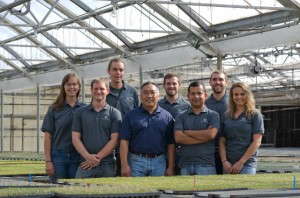Cultivate’15 Session Reveals How To Attract Young Growers, And Keep Them

Tagawa Greenhouses has made an effort to recruit and retain young growers.
A dynamic discussion during Cultivate’15 between growers, horticulture professors and both current students and recent graduates, provided some insight on how grower operations can attract the next generation of growers, and what’s important to make them stay once you hire them.
The session, “Attracting the Next Generation of Industry Professionals,” featured a panel including Dr. Peg McMahon of The Ohio State University’s Horticulture and Crop Science Department, Dr. Marvin Miller of Ball Horticultural Co., Dr. Brian Jackson from North Carolina State University’s Department of Horticulture, Lloyd Traven of Peace Tree Farm, Douglas Schuster of Kingwood Center and Courtney Crawford of Millcreek Gardens.
The preface for the session is something many industry professionals have lamented for years now — enrollment in college horticulture programs is dropping, and university programs are losing funds or disappearing. Much of this may be attributed to the perception among potential students and their parents that horticulture means a low-pay, low-skill, minimally educated, dead-end career. However, the panel attested that the opposite is true, as demand is increasing for individuals with the skills and knowledge to manage sophisticated production systems and maintain sustainable business practices. The program promised a lively discussion, and the panel and its audience did not disappoint.
While graduates of four-year degrees are certainly preferred within the industry, finding professionals or even general labor in non-traditional means is becoming more of a necessity. Traven recommended the career website goodfoodjobs.com, where a variety of jobs are posted related to the food and horticulture industry.
“Young people want to grow,” Traven says. “You will be swarmed with people. We received applications from seven countries. Good, quality people contacted us and said, ‘I want to come work for you; I love what you’re doing.’ They are desperate for work, and some will even work for you for nothing. We had couples contact us and ask to work for the season, in exchange for food and a place to stay. That’s not the caliber of people we were looking to hire, but for a grower who needs labor during the busy season, it could be a good resource.”
One of the audience members said, as a humanities major from Ohio State, he got into the business by volunteering at an organic farm.
“How well do we communicate jobs in horticulture from a humanities objective?” he asked. “Food supply is a huge human crisis.”
Another audience member said, as a gardener for a long time, who went to graduate school for horticulture, she’s having a hard time finding relevance in the field. Horticulturists talk about landscape architects and how they don’t know a lot about plants, but horticulturists need to know more about design and how plants work in the environment, and not be focused as much on just skills, such as how to prune and plant.
McMahon said horticulture is a mix of two things — from the agronomy side, it provides food for the body, while from the ornamental perspective, it is food for the soul, and nourishment for humanity. That’s the way, she said, that the industry needs to communicate jobs in horticulture.
An audience member from Kokomo, Ind., said a few years ago, during the crisis in the automobile industry, Kokomo’s economy was devastated, and now Forbes magazine is rating it a top five city. What turned it around? A local greenhouse program.
“People in the industry don’t see it, but towns are calling beautification an improvement of the quality of life,” he said. “Universities with horticulture programs need to work with cities to help them improve the look and feel of their municipality, and the quality of life for their residents.”
Perhaps it’s time, he suggested, for horticulture departments to create new career tracks in horticulture education, to allow students to pursue jobs like “quality of life consultant.”
A grower in the audience said he graduated with a double engineering degree. In the industry, we need engineers and marketers — students don’t need a horticulture degree to get into this business. They need good judgement, good work ethic and the ability to get along with others.
One of the AmericanHort HortScholars said as a recent graduate, money is important, but more importantly, he wants to know that he has made an impact with the work that he’s doing. Further, he said kinesthetic learning is important in horticulture, and for people who don’t have degrees in horticulture but want to pursue careers in this space, learning by doing is important and valuable.
An audience member said he has not been able to attract students with a bachelor of science in horticulture, and it seems to be a phenomenon that graduates don’t want to move away from home, or they want to live close to the city and their friends. But most greenhouse operations are located in rural areas and living in the city is not often conducive to working in a rural setting.
What kind of salary does it take for a graduate with a horticulture degree to get started working at a greenhouse operation? About $35,000 to $40,000, and growers are willing to pay that, said an audience member who runs a greenhouse operation.
But for someone with experience, it doesn’t take long for a grower to make a much higher salary — perhaps as high as six figures — once established, 15 years or so into their career, a panelist said. That’s a disconnect — a point that’s not being communicated between the industry, and potential students and their parents. The first thing mentioned, the biggest misconception, is still that you can’t make money in this industry. As long as we keep saying that and let it be said about our industry, we’ll continue to have problems recruiting young people to horticulture.
“I don’t know of a two-year student who doesn’t have a job lined up,” another panelist said. Two-year horticulture students are able to take propagation and other technical courses. They get right into the greenhouse and are hands-on learners.

Michael Walker, AgVets CEO, is developing an operation run and managed entirely by military veterans.
Veterans are perfect candidates for these types of programs, and the industry is starting to see an influx of interest among veterans returning from military duty. One audience member, just retired from the military after 33 years, suggests growers look for veterans to work for them.
“They have great work ethic, esprit de corps and they’re used to travel,” he said.
In the end, university horticulture programs and the industry need to improve communication about careers in horticulture. We need to let people know, it does require training, but the benefits and possibilities are endless.
Miller interjected a suggestion that the industry keep one word in mind.
“The core of what we are talking about in this industry is passion,” he said. “When you start talking to people about this industry and the careers available within it, please tell your story, and tell it with passion. That is what will draw people in the most.”
Read more about how the industry can get creative with grower recruitment, and what Smith Gardens is doing to recruit new growers.










